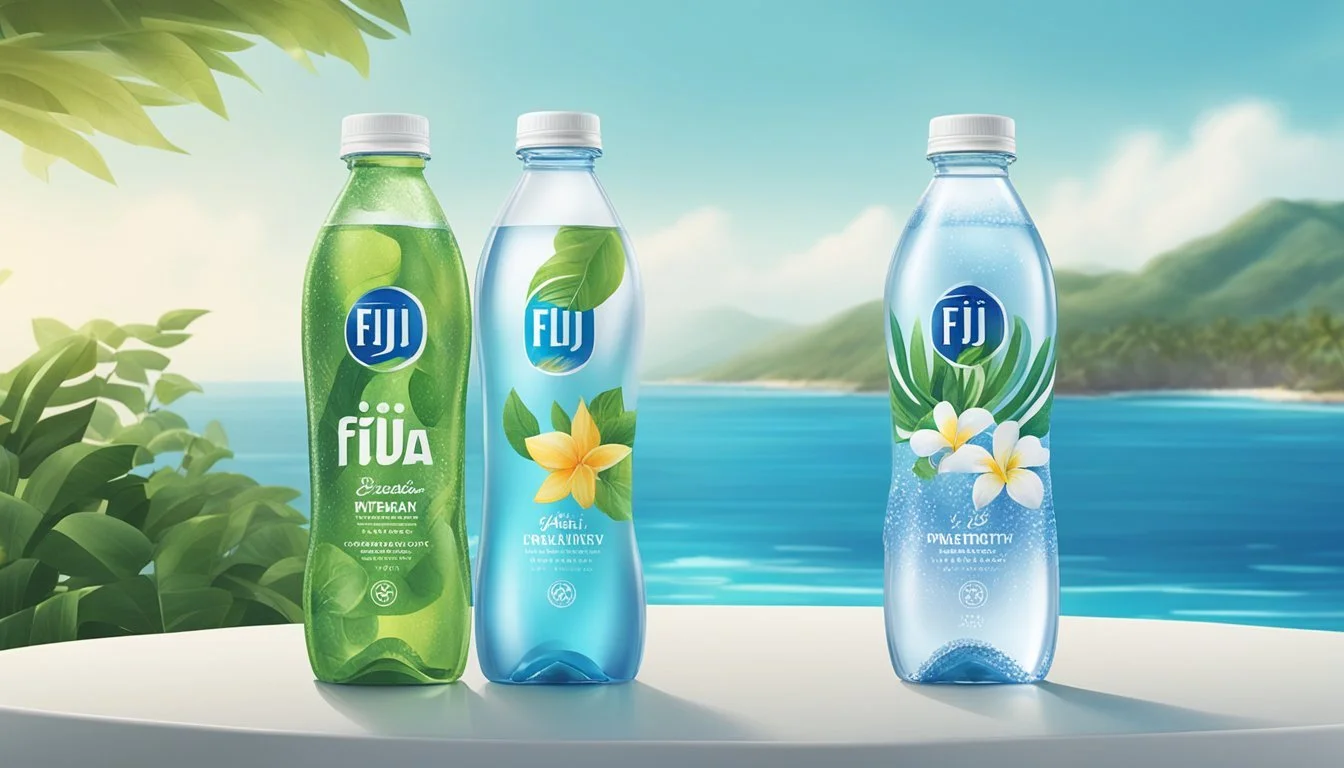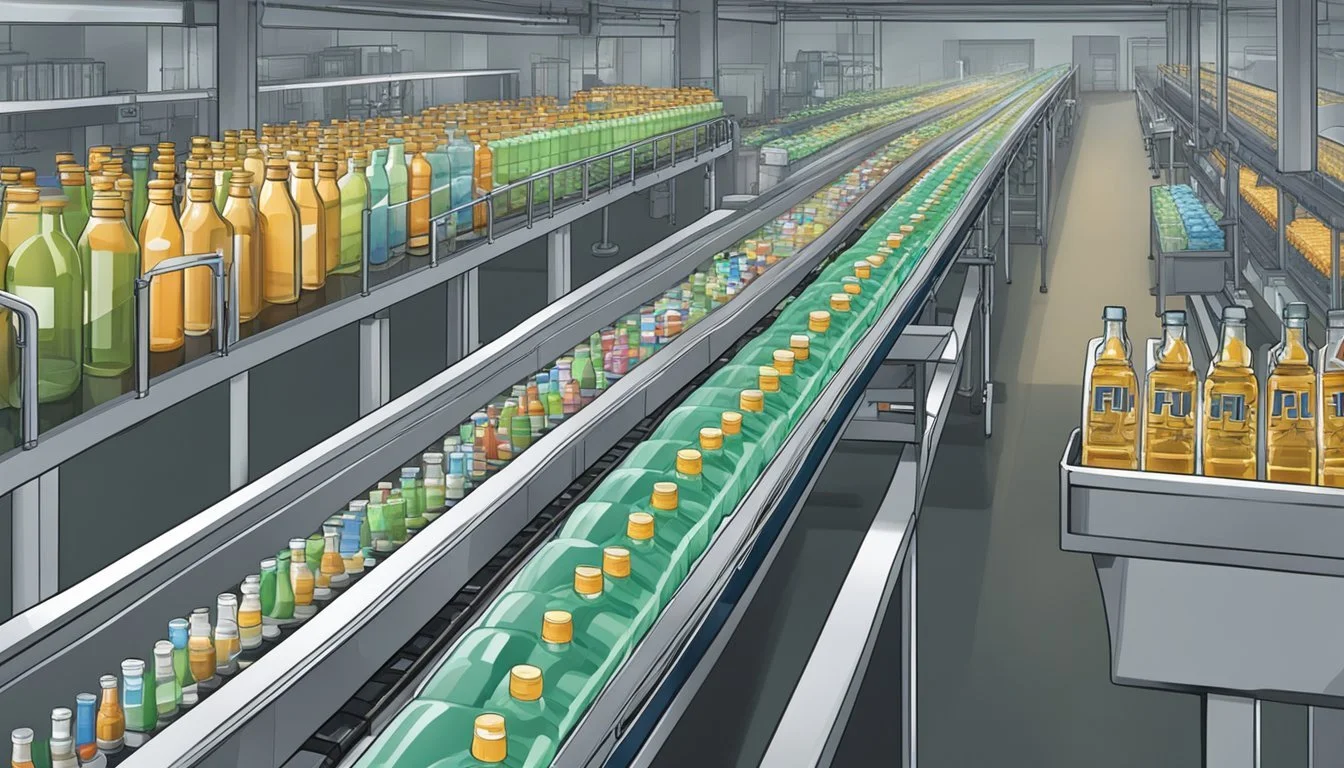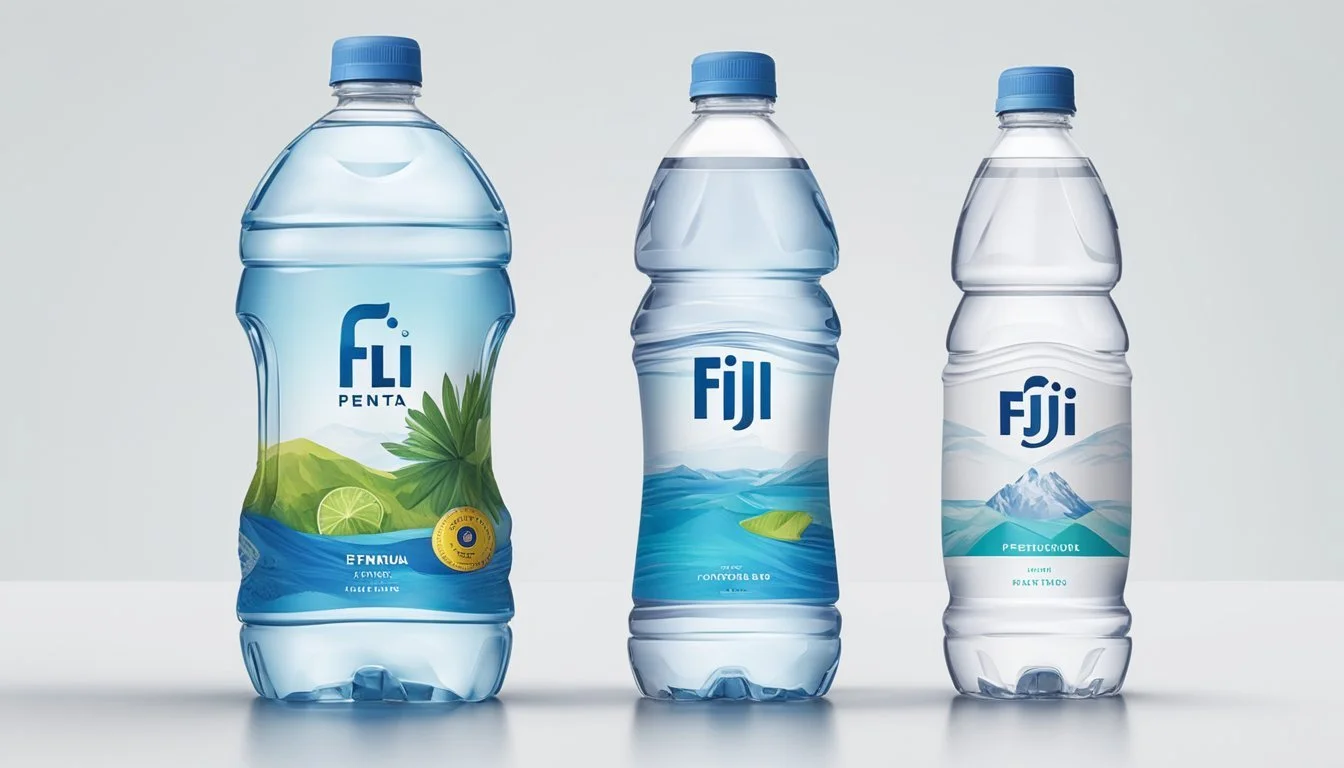Fiji vs. Penta
Comparing Taste, Purity, and Sustainability of Bottled Water Brands
When it comes to selecting bottled water, consumers are faced with a plethora of choices, each boasting unique selling points from purity to mineral content. Among the top contenders in this saturated market are Fiji and Penta. These brands have carved their niches, Fiji being renowned for its natural artesian water sourced from the tropical islands of Fiji, and Penta, acclaimed for its ultra-purified drinking water with a nine-step filtration process. The debate between Fiji and Penta transcends mere brand preference; it taps into consumer values concerning taste, health benefits, and environmental impact.
Understanding the differences begins with the source and processing of the water. Fiji water originates from an aquifer in the Fiji Islands and is known for its soft mouthfeel and high silica content, which is believed by some to provide health benefits. Conversely, Penta water undergoes a comprehensive purification process, designed to remove impurities and achieve high levels of purity, resulting in a distinctly clean and crisp taste. Both brands present their own advantages, whether it's the natural minerals and electrolytes found in Fiji water or the rigorous purification and potential absence of contaminants in Penta water.
The choice between Fiji and Penta water is not merely about quenching thirst but is reflective of individual preferences regarding taste, quality, and the methodologies behind water purification and bottling. As consumers grow more informed about the subtleties of bottled water, the discussion over which brand stands superior continues to evolve, driven by personal priorities and the values held by the drinker.
Historical Background of Bottled Water Brands
Bottled water brands Fiji and Penta have distinct histories that contribute to their standing in the market today. Both brands have navigated the growing consumer preference for bottled water, leading them to become recognized names in the industry.
The Rise of Fiji
Fiji Water was established in 1996 by a Canadian businessman and quickly tapped into the premium bottled water market. Sourced from an artesian aquifer in Fiji’s Viti Levu, Fiji Water became known for its exotic origin and premium branding. Within a short span, it surpassed competitors like Evian in the American market, distinguishing itself as a status symbol.
Date Established: 1996
Source: Artesian aquifer in Viti Levu, Fiji
Market Milestone: Surpassed Evian in the U.S. imported water segment
Brand Perception: Premium status symbol
The Evolution of Penta
Penta Water, although less well-known, has its own unique approach within the bottled water market. Utilizing a patented 13-step purification process, which includes spinning the water under high speed and pressure to reduce the size of the water clusters, Penta claims that this technique renders a purer and more easily absorbed water.
Key Feature: Patented 13-step purification process
Brand Claim: Enhanced hydration through smaller water clusters
Market Dynamics and Brand Perception
Both Fiji Water and Penta Water thrived in an evolving bottled water market where consumer preferences shifted towards individual brand stories and purity. Fiji’s branding leverages its tropical source and environmental initiatives, while Penta emphasizes scientific advancements in purification for health-conscious consumers. The market's dynamics have allowed both brands to create their unique identities that resonate with different audience segments.
Fiji Water:
Identity: Tropical, pristine origin with environmental consciousness
Consumer Base: Those valuing brand prestige and exotic appeal
Penta Water:
Identity: Scientifically advanced, health-focused water
Consumer Base: Health and hydration-aware individuals
As Fiji and Penta continue to operate in this competitive market, their histories and brand perceptions play crucial roles in their ongoing narratives.
Sourcing and Production Processes
The sourcing and production of bottled water are vital to its quality and environmental footprint. Fiji and Penta offer distinct processes, from the very source of the water to the method of its purification.
Fiji: Sourcing from the Fijian Aquifers
Fiji Water originates from an artesian aquifer located in the Yaqara Valley of Viti Levu, one of Fiji's two principal islands. This artesian aquifer is a natural underground reservoir that remains protected from external elements until bottled. The water is obtained from wells that tap into this protected aquifer, ensuring that Fiji Natural Artesian Water is filtered naturally through volcanic rock where it acquires minerals and electrolytes before being bottled.
Penta: Ultra-Pure Water Via Hydro-7 Filtration
In contrast, Penta water undergoes a rigorous purification process known as Hydro-7, which is a proprietary filtration method comprising of seven distinct steps. This includes deionization, UV light treatment, and microfiltration, among others. The result is ultra-pure water that boasts a purity measured in parts per billion. Penta emphasizes that its process removes more impurities than standard filtration practices commonly used in the bottled water industry.
Environmental Impact of Water Sourcing
The extraction and bottling processes have implications for the environment. Fiji's natural water is sourced from a remote island, which involves significant transportation and therefore a higher carbon footprint to reach global markets. The environmental impact of this sourcing is a growing concern for environmentally-conscious consumers. Conversely, Penta's water, while heavily processed, emphasizes the use of recyclable plastic and has focused on reducing the carbon footprint of its production facilities. However, the extensive treatment and energy used in the Hydro-7 purification process must also be factored into the overall environmental equation.
Health Benefits and Water Quality
When assessing the health benefits and water quality of Fiji and Penta bottled water, it is important to examine specific factors such as purity, mineral content, and the capacity to hydrate effectively. These elements play a crucial role in determining how beneficial the water is to one’s health.
Purity and Contaminants
Fiji water is drawn from an underground aquifer in the Fiji Islands and is praised for its natural filtration process, which reduces potential contaminants. Penta water undergoes a patented 13-step purification process that includes ultraviolet light and ozone treatments, ensuring a high level of purity with minimal contaminants. Both brands assert their water is free from discernible impurities and pollutants.
Mineral Content: Calcium and Magnesium
Calcium and Magnesium are minerals that are essential for maintaining bone health and metabolic functions.
Fiji Water typically contains natural minerals, with notable levels of calcium and magnesium due to its source from a natural artesian aquifer.
Penta Water markets itself as ultra-pure and thus does not contain significant levels of these naturally occurring minerals, as they are removed during their extensive purification process.
Hydration and Electrolytes in Water
Hydration is a key aspect of health, and electrolytes such as sodium and potassium contribute to effective hydration by maintaining fluid balance. While Fiji water contains some naturally occurring electrolytes, it may not be as significant as specifically formulated electrolyte-enhanced waters. Penta water, focusing on ultra-purity, does not contain added electrolytes but promotes its small water-cluster size for optimal cellular absorption and hydration.
Taste Profile and Preference
When considering Fiji and Penta bottled waters, one must examine their distinct taste profiles, which are influenced by pH levels, mineral content, and expert and consumer feedback.
Bottled Water Taste Comparison
Fiji Water is known for its smooth, soft taste, often attributed to the silica it contains. This distinct taste profile sets it apart from many other brands on the market. In contrast, Penta water is ultra-purified and boasts a clean and crisp taste free of the majority of dissolved solids typically found in tap water or some bottled waters.
Fiji Water: Smooth, soft taste due to silica content.
Penta Water: Clean, crisp taste; lacks dissolved solids.
Water Taste Influenced by pH Levels and Minerals
The pH level and mineral content of water can greatly affect its taste. Fiji Water's pH typically hovers around 7.7, making it slightly alkaline, which can contribute to its smooth taste. The presence of minerals like silica, calcium, and magnesium also contributes to Fiji's unique flavor profile. Penta Water, however, prides itself on a near-neutral pH that is achieved through an extensive purification process, resulting in a distinct taste preferred by some consumers.
Fiji Water: Slightly alkaline (pH 7.7); contains minerals such as silica, calcium, and magnesium.
Penta Water: Near-neutral pH; minimal mineral content due to purification.
Expert and Consumer Reviews
Taste preference is subjective, but reviews and taste tests can provide insight into consumer preferences. Athletes and celebrities who consume bottled water may endorse a particular brand based on its taste or purported health benefits. Consumer reviews often highlight Fiji Water's tropical origins and premium taste, associating it with a luxurious experience. Penta's purity and pH balance are frequently emphasized in reviews, appealing to those who prioritize the absence of additives or contaminants.
Fiji Water: Praised for premium, natural taste; tropical origins; popular among luxury consumers.
Penta Water: Favored for purity and balanced pH; often chosen by health-conscious individuals and those seeking purity.
Packaging and Environmental Sustainability
In the duel between Fiji and Penta, the impact of their packaging on the environment is a pivotal factor. This section delves into the types of materials used, the carbon footprint of their packaging, and the recycling initiatives each brand pursues.
Plastic vs. Glass Bottles
Fiji has committed to environmental sustainability by transitioning its 500 mL and 330 mL bottles to 100% recycled plastic (rPET). This shift substantially decreases the production of new plastic, and virtually replaces 65% of Fiji's bottle volume in the United States with recycled content.
Penta, on the other hand, may use traditional plastic or glass options. Glass, while often perceived as eco-friendlier, can result in a higher energy footprint due to its manufacturing and recycling processes. Fiji’s move to rPET places it ahead in the context of reducing reliance on single-use plastic.
Carbon Footprint of Packaging
The production and transportation of packaging materials contribute significantly to their carbon footprint. Fiji Water’s rPET bottles are inherently lighter than glass and save energy in both production and transport. This switch to recycled content aids in lowering the carbon footprint associated with their packaging.
Penta's packaging, should it use glass, incurs a heavier carbon toll due to the weight of the bottles and the energy consumed during production and recycling. If using plastic, the carbon impact would be less than glass, but still more than rPET if not using recycled materials.
Recycling and Eco-Friendly Initiatives
Fiji Water has been proactive in its eco-friendly initiatives. Fiji announced a timeline to make all its plastic bottles from 100% recycled plastic by 2025. This illustrates a commitment to not only recycling but also to supporting a circular economy.
Penta’s environmental efforts would need to involve recycling programs and potential use of BPA-free materials, which can minimize environmental and health impacts. Their use of aluminum, should they offer it, presents a high recyclability factor but must also be factored into their overall environmental sustainability profile.
Global Presence and Accessibility
When assessing the global reach of Fiji and Penta bottled water, it's essential to consider their distribution channels, regional popularity, and export significance. These factors directly influence each brand's availability to consumers worldwide.
Distribution Channels and Worldwide Availability
Fiji Water has established a robust distribution network that spans multiple continents, making it readily available in numerous countries. Its success is driven by the high demand for its product, which is often associated with its exotic origin and premium branding. This extensive distribution is supported by partnerships with major retailers, restaurants, and hotels globally.
Penta Water, while available internationally, has a more concentrated presence in the United States. It utilizes both online platforms and brick-and-mortar stores to reach consumers, focusing on its ultra-purified drinking water's health benefits.
Popular Bottled Water in Different Regions
In the United States and other Western markets, Fiji Water stands out as a preferred choice among premium bottled water brands, featuring an iconic square bottle and well-known label. Its marketing campaigns highlight the tropical origins and pure composition of the water, factors that contribute to its high ranking in consumer surveys.
Penta Water, on the other hand, while less globally recognized than Fiji, maintains a dedicated following, especially among health-conscious individuals. Its ultra-purified status appeals to those seeking bottled water with minimal impurities.
Country's Biggest Export: Fiji Water
Fiji Water is one of Fiji's most prominent exports, underlining its significant role in the country's economy. With a market that extends far beyond its shores, Fiji Water is often seen as an ambassador for its namesake country, linking the brand's perception directly to the tropical island nation.
In contrast, Penta Water does not hold the same export status for the United States. While it is a valued product within its niche, it does not contribute to U.S. exports as significantly as Fiji Water does to Fiji's economy.
Consumer Trust and Brand Loyalty
Consumer trust and brand loyalty in the bottled water market hinge on effective advertising strategies, celebrity partnerships, and overall customer satisfaction metrics. These elements are critical in influencing consumer choice between Fiji and Penta bottled water brands.
Advertising Strategies and Brand Image
Fiji Water has crafted a brand image that resonates as exotic and pure, often showcasing the natural beauty of the Fijian islands from which it sources its water. This branding suggests a serene origin, potentially increasing consumer trust through a perceived purity of the product. In contrast, Penta Water focuses on the scientific aspects of its ultra-purified drinking water, emphasizing health benefits and technological advancements in water purification. Both brands leverage their unique selling propositions to foster brand loyalty.
Celebrity Endorsements and Sports Partnerships
Celebrity endorsements play a significant role in building brand image and trust. Fiji Water has been known to partner with high-profile events like the Golden Globe Awards, which often features celebrities photographed with the product, thereby enhancing its visibility and appeal. Sports partnerships are another avenue through which bottled water brands such as Smartwater have gained trust. By aligning with athletes who embody health and performance, brands like Smartwater benefit from a halo effect that can translate into consumer trust and, ultimately, brand loyalty.
Customer Satisfaction and Repeat Buyers
Customer satisfaction is the cornerstone of brand loyalty. Both Fiji and Penta have their devoted customer bases. Fiji Water often receives praise for its taste and packaging design, which can be attributed to its high net favorability rating and customer testimonials extolling its crisp and clean taste. Penta, while perhaps less prominent in consumer reviews, markets itself on providing a distinctly pure drinking experience, which may appeal to a niche market focused on the technical aspects of water purification. Positive customer experiences with these bottled waters are indicative of high repeat purchase rates, which reinforce brand loyalty over time.
Comparing Water Safety Standards
When evaluating bottled water like FIJI Water and Penta Water, understanding their adherence to water safety standards is essential. This includes examining regulations, testing, and public trust.
Regulations on Bottled Water
Bottled water is regulated to ensure safety from contaminants, including heavy metals and other impurities. In the United States, the Food and Drug Administration (FDA) oversees these regulations, which are comparable to the Environmental Protection Agency's (EPA) standards for tap water. Both FIJI Water and Penta Water comply with these regulations, holding them to specific water quality and safety standards.
Independent Testing and Accreditation
Independent testing plays a pivotal role in verifying water quality. FIJI Water and Penta Water are subject to third-party inspections for water safety. These tests look for heavy metals, microbial presence, and other potential contaminants. Often, they will seek accreditation or certification from independent bodies to affirm their filtration methods and safety standards.
FIJI Water typically uses a natural artesian aquifer for its source, which naturally filters water through volcanic rock, adding minerals and electrolytes.
Penta Water claims a specialized ultra-purification process designed to remove any impurities, including heavy metals and contaminants.
Public Trust in Water Safety
The public's trust in bottled water safety is often influenced by the brand's transparency and reported safety standards. Both FIJI Water and Penta Water have established a degree of trust with consumers, with clear labeling and open communication regarding their respective sources and filtration processes. This transparency is essential for maintaining consumer trust in the safety and quality of bottled water.
Conclusion
When considering Fiji Water and Penta Water, consumers must weigh several factors:
Taste: Fiji Water has a unique mineral profile and taste, appealing to those who favor a distinctive flavor. Penta Water is marketed for its ultra-purification process, which may be preferred by those seeking purity over mineral content.
Purity: Penta undergoes a rigorous 13-step purification process, resulting in high purity levels. Fiji, while also pure, emphasizes its natural minerals and electrolytes.
Environmental Impact: Fiji Water's use of plastic bottles draws concern for its environmental footprint. Consumers conscious about sustainability might gravitate towards Penta if it employs more eco-friendly packaging.
The choice between Fiji and Penta ultimately depends on individual preferences and values. Those who prioritize taste and the presence of natural minerals might choose Fiji, while those valuing purity and potentially environmental considerations might prefer Penta.
Both brands offer high-quality bottled water, but the decision should consider the long-term effects on the environment as well as personal health goals. With this information, consumers can make an informed choice that aligns with their preferences and values.






